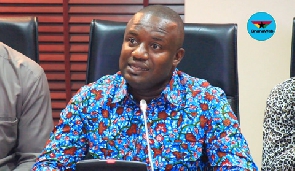Member of Parliament for Yapei-Kusawgu, John Abdulai Jinapor, has charged the government to prosecute individuals involved in the wrongful termination of the Emergency Power Agreement with the GCGP Limited against all advice, for causing financial loss to the State.
Mr. Jinapor pointed out that the premature abrogation of the contract has dented the image of Ghana in the international community, hence the need for government to bring the perpetrators to book.
His comments come after Ghana has been slapped with $134million judgment debt over the cancellation of the Emergency Power Agreement with GCGP Limited.
The ruling by the International Court of Arbitration ordered the government to Ghana to pay to “GPGC the full value of the Early Termination Payment, together with Mobilization, Demobilization and preservation and maintenance costs in the amount of US$ 134,348,661, together also with interest thereon from 12 November 2018 until the date of payment, accruing daily and compounded monthly, at the rate of LIBOR for six-month US dollar deposits plus six per cent (6%).”
The Government of Ghana was also to pay GPGC an amount of “US$ 309,877.74 in respect of the Costs of the Arbitration, together with US$ 3,000,000 in respect of GPGC’s legal representation and the fees and expenses of its expert witness, together with interest on the aggregate amount of US$ 3,309,877.74 at the rate of LIBOR for three-month US dollar deposits, compounded quarterly.”
Ghana’s Energy Minister in cancelling the deal said the decision was justified because among other things, GPGC had started construction activities on site without siting and construction permits and those activities were illegal.
Mr. Jinapor said, “If you refer to the document from the International Court of Arbitration, paragraph 492 of the 194-paged document it is clearly stated that if the Minister and the State had opted for a settlement termination, we would have paid a maximum of eighteen(18) million dollars”.
“What it means is that the state would have saved a whopping hundred and forty-six(146) million dollars, if we had even opted for a settlement, on the contrary, this government decided that they will terminate the agreement against all expert advice, against advice from the minority, against advice from civil societies and today we are saddled with a hundred and sixty-four(164) million dollar debt that we have to pay when we could have settled for only eighteen(18) million dollars” he pointed out.
The Yapei-Kusawgu lawmaker went on to charge that “those responsible for this avoidable judgment debt and financial loss to the state must be held liable and punished for this crime against the state”.
Private legal practitioner Mr Bobby Banson has suggested that henceforth, the legislature should be involved in the decision-making process to terminate all government international transactions.
He explained on the Key Points on TV3 Saturday, February 20 that since parliament approves such transactions after scrutinizing those contracts, any decision that goes into the abrogation should require parliament’s input.
Br Banson told the host of the Key Points Abena Tabi that “I would rather ask that in as much as transactions of an international business nature require parliamentary approval before the government of Ghana signs or executes them, when the government of Ghana decides to terminate them, the termination must also get the consent of parliament
“Because it is trite in law that once you consent to something you are needed when the consent has to be withdrawn so that when that happens, there will be an open debate as to whether or not the termination is justified.
“If a whole parliament representing all of us have approved a transaction with all the terms that came with it and those who presented the contract did their due diligence and added technical reports why the contract was necessary for the government of Ghana, it should not be for one person to terminate it.”
General News of Monday, 22 February 2021
Source: 3news.com

















